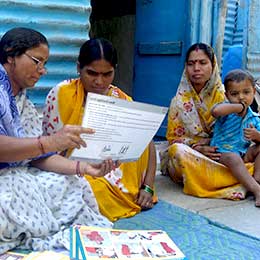FANTA worked with partners in Bangladesh to develop PROFILES estimates that calculate the benefits of improved nutrition on health and development outcomes and the consequences if malnutrition does not improve. FANTA also developed a model to estimate the costs of providing nutrition services throughout the country. The combination of PROFILES and the nutrition costing model provided a better understanding of the gains that could be achieved by reducing and preventing malnutrition and how much it would cost to provide the needed nutrition services to reduce the prevalence of malnutrition. The results were well timed—the Government of Bangladesh used them to help with decisions about resource allocation in the national budget.
Building on this work, FANTA developed a nutrition advocacy strategy targeting parliamentarians, policymakers, civil society organizations, development partners, and the media with advocacy materials such as policy briefs, fact sheets, and a handbook to enhance the media’s reporting on nutrition. To implement this strategy, FANTA held meetings with stakeholders to convey both the impact of nutrition on health, education, and development and the need for increased resources for nutrition and multisectoral coordination. Results from these efforts are included in our report on “Integrating and Strengthening Maternal and Child Nutrition in Health Service Delivery in Bangladesh.”



